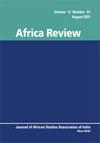An overview of the obstacles to the African economic integration process in view of the African continental free trade area
IF 0.5
Q4 AREA STUDIES
引用次数: 15
Abstract
ABSTRACT African governments signed the largest trade agreement, the Continental Free Trade Agreement in 2018 in order to boost intra-trade thereby improving economic welfare of African citizens. This paper provides an overview of the obstacles to the African economic integration process experienced in the past and the possible solutions. The paper discussed the theoretical postulations and empirically reviewed some African experiences. Some theoretical aspects included not only the traditional international trade theories but also other non-orthodox theories such as organizational theories which include intergovernmentalism, neofunctionalism and neorealism. Empirically, Africa’s economic integration challenges range from economic such as polarization of benefits towards larger economies at the expense of smaller economies, an unclear model of distributing welfare gains (or losses), traditional trade models which do not stimulate intra-African trade, several non-tariff and institutional barriers among other factors. Other challenges include lack of political will to implement signed trade contracts and political instability in some economic regions which results in small and fragmented markets. The paper also discussed the legal challenges such as lack of standardization on products and procedures which result in subjectivity in interpretation of trade instruments. The paper made recommendations to each identified challenge in order to make the CFTA more effective.从非洲大陆自由贸易区的角度概述非洲经济一体化进程的障碍
非洲各国政府于2018年签署了最大的贸易协定——大陆自由贸易协定,以促进内部贸易,从而改善非洲公民的经济福利。本文概述了过去非洲经济一体化进程中遇到的障碍以及可能的解决办法。本文讨论了理论假设,并对非洲的一些经验进行了实证回顾。一些理论方面既包括传统的国际贸易理论,也包括一些非正统的理论,如政府间主义、新功能主义和新现实主义等组织理论。从经验上看,非洲的经济一体化挑战包括经济上的,例如以牺牲较小经济体为代价向较大经济体提供的利益两极分化,分配福利收益(或损失)的不明确模式,不能刺激非洲内部贸易的传统贸易模式,以及其他因素中的一些非关税和制度障碍。其他挑战包括缺乏执行已签署的贸易合同的政治意愿和一些经济区域的政治不稳定,导致市场小而分散。本文还讨论了诸如产品和程序缺乏标准化等法律挑战,从而导致对贸易文书的解释存在主观性。该文件针对每个确定的挑战提出了建议,以使CFTA更加有效。
本文章由计算机程序翻译,如有差异,请以英文原文为准。
求助全文
约1分钟内获得全文
求助全文
来源期刊

Africa Review
AREA STUDIES-
CiteScore
1.80
自引率
12.50%
发文量
22
期刊介绍:
Africa Review is an interdisciplinary academic journal of the African Studies Association of India (ASA India) and focuses on theoretical, historical, literary and developmental enquiries related to African affairs. The central aim of the journal is to promote a scholarly understanding of developments and change in Africa, publishing both original scholarship on developments in individual countries as well as comparative analyses examining the wider region. The journal serves the full spectrum of social science disciplinary communities, including anthropology, archaeology, history, law, sociology, demography, development studies, economics, education, gender studies, industrial relations, literature, politics and urban studies.
 求助内容:
求助内容: 应助结果提醒方式:
应助结果提醒方式:


